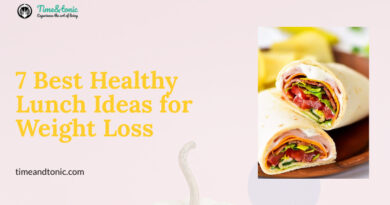The 5 Best Diets for Women Over 50
Entering the golden phase of life, women over 50 embark on a journey where health and vitality take center stage. Nurturing well-being becomes an art, and dietary choices play a pivotal role. In this exploration, we unravel the quintessential diets tailored for women navigating their fifties—each a testament to fostering strength, resilience, and longevity.
From the heart-healthy embrace of the Mediterranean Diet to the personalized touch of Weight Watchers (WW), discover the transformative power of these dietary blueprints. Join us as we navigate the landscape of wellness, uncovering the best dietary companions for women over 50, ensuring a vibrant and fulfilling journey through this enriching chapter of life.
Best Diets for Women Over 50
1. Mediterranean Diet

The Mediterranean Diet, revered for its holistic approach to health and longevity, is a nutritional philosophy inspired by the traditional dietary patterns of countries bordering the Mediterranean Sea. At its core, this diet champions the consumption of whole, nutrient-dense foods that contribute to overall well-being. A bounty of fresh fruits and vegetables, rich in vitamins and antioxidants, forms the foundation. The diet emphasizes heart-healthy fats from sources like olive oil and fatty fish, promoting cardiovascular health. Whole grains, legumes, and nuts provide sustained energy and essential nutrients.
The occasional indulgence in red wine, enjoyed in moderation, adds a touch of antioxidant-rich pleasure. With its focus on balance, variety, and the joy of shared meals, the Mediterranean Diet stands not just as a culinary tradition but as a lifestyle that fosters vitality, longevity, and a profound connection between nourishment and wellness.
- Heart Health: The Mediterranean diet is linked to improved heart health, reducing the risk of heart disease.
- Weight Management: It aids in weight management, making it easier to maintain a healthy weight.
- Type 2 Diabetes: Studies show it can reduce the risk of developing Type 2 diabetes.
For More- Grandma’s Church 7 Potluck Desserts
2. DASH Diet

The DASH Diet, or Dietary Approaches to Stop Hypertension, stands as a nutritional beacon for individuals seeking to manage blood pressure and promote overall heart health. This evidence-based approach places a spotlight on foods rich in essential nutrients that contribute to the regulation of blood pressure levels. The DASH Diet encourages a higher intake of potassium, calcium, and magnesium while limiting sodium, thereby supporting optimal cardiovascular function.
Key components include an abundance of fruits, vegetables, lean proteins, whole grains, and dairy or dairy alternatives. By emphasizing nutrient-dense, heart-healthy choices, the DASH Diet empowers individuals to reduce their risk of hypertension and cardiovascular diseases. With its focus on wholesome, delicious foods, this dietary strategy not only supports physical health but also provides a sustainable and enjoyable path toward a heart-conscious lifestyle.
- Blood Pressure Control: It’s designed to control high blood pressure effectively.
- Heart Health: Similar to the Mediterranean diet, it promotes heart health.
3. Paleo Diet
The Paleo Diet, short for Paleolithic, harks back to the dietary patterns of our ancient ancestors and is built on the premise that our bodies are best suited to the foods available to early humans. This diet centers around whole, unprocessed foods that would have been accessible to hunter-gatherer societies. Emphasizing lean meats, fish, fruits, vegetables, nuts, and seeds, the Paleo Diet avoids processed foods, grains, legumes, and dairy.
Proponents argue that this return to a more primal way of eating supports weight loss, improved energy levels, and better overall health by aligning with the nutritional needs of our evolutionary past. While the diet has gained popularity, it’s essential to adapt it to individual needs and consider the benefits of modern nutritional knowledge for a balanced approach to health and wellness.
- Insulin Resistance: It can benefit women with insulin resistance in their 50s.
- Nutrient Deficiencies: Careful planning is essential to avoid nutrient deficiencies.
4. Vegan or Vegetarian Diet
A Vegan or Vegetarian Diet represents a plant-centric approach to nourishment, excluding or minimizing the consumption of animal products. The Vegan Diet abstains from all animal-derived foods, including meat, dairy, eggs, and honey, while a Vegetarian Diet may include some or all of these, depending on variations like lacto-vegetarian or ovo-vegetarian. Both diets emphasize a rich tapestry of fruits, vegetables, grains, legumes, nuts, and seeds.
Renowned for their ethical, environmental, and health-conscious principles, these diets are associated with various benefits, including lower risks of heart disease, type 2 diabetes, and certain cancers. However, careful planning is essential to ensure adequate intake of essential nutrients like vitamin B12, iron, calcium, and omega-3 fatty acids. Embracing a Vegan or Vegetarian Diet not only aligns with compassionate living but also offers a path toward holistic well-being and a more sustainable relationship with the planet.
- Disease Prevention: They can help prevent heart disease and Type 2 diabetes.
- Plant-Based Nutrition: Focusing on plant-based foods can lead to improved health.
5. Flexitarian Diet

The Flexitarian Diet, a flexible and inclusive approach to eating, combines the best of both worlds—embracing a predominantly plant-based diet while allowing for occasional consumption of meat or animal products. This dietary philosophy encourages individuals to prioritize plant-derived foods like fruits, vegetables, whole grains, and legumes, reaping the health benefits associated with a plant-centric lifestyle. Flexitarians enjoy the freedom to include animal products in their diet occasionally, fostering adaptability and personalization.
This approach not only promotes better health outcomes, such as weight management and reduced risk of chronic diseases, but also aligns with sustainability goals by encouraging a reduced reliance on resource-intensive animal agriculture. The Flexitarian Diet reflects a contemporary understanding of nutrition, emphasizing balance, variety, and mindful choices, making it an accessible and realistic option for those seeking a more plant-forward yet adaptable approach to healthy eating.
- Heart Health: It can improve heart health and weight management.
- Nutrient Intake: It prevents deficiencies in essential nutrients like iron and omega-3s.
Also Read- 10 Best Fast-Food Burgers In America
Conclusion
As women enter their fifties, choosing a diet that aligns with their unique needs and health goals becomes paramount. The Mediterranean Diet, DASH Diet, Anti-Inflammatory Diet, WW, and a Vegetarian or Plant-Based Diet offer diverse options tailored to support heart health, manage weight, and promote overall well-being. It’s crucial to approach dietary changes with consideration for individual preferences, health conditions, and lifestyle factors, seeking guidance from healthcare professionals when needed. By embracing a nourishing lifestyle and making informed dietary choices, women over 50 can embark on a journey of healthy aging, ensuring vitality and well-being in the years to come.
FAQs
The Mediterranean Diet is rich in heart-healthy fats, antioxidants, and nutrients, supporting cardiovascular health and cognitive function—crucial considerations for women navigating the aging process. Its emphasis on whole foods and balanced nutrition makes it an excellent choice for overall well-being.
The DASH Diet is specifically designed to control blood pressure, a concern that becomes more prevalent with age. By promoting a nutrient-rich, low-sodium approach, it not only supports cardiovascular health but also addresses potential issues related to hypertension commonly faced by women in their fifties.
Yes, a well-planned plant-based diet provides ample nutrients for women over 50. It can contribute to heart health, weight management, and improved digestion. However, careful attention to essential nutrients like B12, iron, and omega-3 fatty acids is necessary to ensure comprehensive nutrition.




